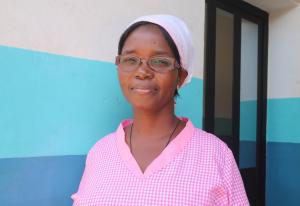Midwifery, a life passion
Lomé – Three years ago, Massalou Tchonda, a midwife at the Tsévié Polyclinic near the Togolese capital of Lomé, was attending to a patient expecting twins.
“After the first one came out, the second seemed to be blocked by the placenta. I was convinced the patient wouldn’t be able to give birth on her own,” she recalls. Just as she was hurriedly preparing to perform an emergency evacuation procedure, the other baby’s head appeared. Seconds later, he was out in the world.
“It was the best experience!” Massalou enthuses.
Midwives play an essential role in the promotion of health and in the provision of primary and community health care. They provide care in emergency situations and play a major role in making universal health coverage a reality. The International Day of the Midwife, celebrated on May 5th, highlights the importance of the role of midwives for the health of mothers, children, and their families.
Massalou, 52, has been a midwife for 24 years. The profession came naturally to her.
“I’ve admired midwives since I was very young,” she says. “I recognized that not everyone could guide the birthing process. So at the earliest opportunity, I took the entrance exam for the national midwife school so I could complete the necessary training.”
After graduation, Massalou was deployed to several regions of Togo, putting her skills to work for mothers and their children. More than two decades later, she admits to never having taken the time to actually count the number of babies born into her hands.
“It’s probably in the thousands by now,” she says, “but each one is still unique for me, even today.”
To hear Massalou tell it, the joys of the profession are manifold.
“I see an average of 240 women per week, of whom 20 come to give birth. It brings me immense joy to hear a newborn’s cry. Being the first person to receive this infant into the world, hearing its cry, seeing the mother’s expression go from suffering to smiling, is gratifying in so many ways.”
Over the course of her career, she has seen midwifery evolve a great deal and take on additional responsibility.
“Midwives today are more involved in the treatment of mother and child during delivery. For example, we can now carry out the resuscitation of babies, practice sutures on mothers when the need arises, etc. With modern equipment, midwives are well trained to react swiftly and competently.”
But not all is rosy.
“Our work touches the lives of others. If it’s done well, the person is fine; but one mistake on our part can lead to lifelong consequences that affect not just one individual, but an entire family, an entire community.”
The profession comes with many challenges, among them the lack of equipment and treatment materials. Patients of limited financial means also face disadvantages.
“Being a midwife isn’t simply about accompanying women through pregnancy to delivery,” Massalou says. “It’s also about playing multiple connected roles, especially in areas where there are few medical professionals. We are called on to be nutritionists, paediatricians, and psychologists as well. I often find myself lending a hand financially with patients who are too poor to afford even basic necessities.”
Not least among the difficulties, she says, is a negative perception of midwives that has sprung up in recent years.
“Before, midwives were more respected. But now, because of the behaviour of a small number of people, many people have developed negative prejudices,” she laments. “Midwives are no longer held in as high regard.”
She attributes this sad state of affairs to the bad experiences some women have endured during delivery.
“Being a midwife is a noble profession that has been regrettably stained by these negative experiences. I see it in the patients and families who come to us. Many arrive already on the defensive; the women are uptight and fearful of receiving bad treatment.”
In view of this situation, Massalou makes sure to offer advice to young people aspiring to the profession.
“I encourage young people to pursue this path, but to do it with heart. Prioritizing money is no way to become a good midwife,” she says.
She reminds students who intern with her that midwifery is a vocation.
“In our profession, one little mistake can cost lives. If you’re driven by material concerns, your frustration will reflect in your work and the consequences can be very dangerous,” she warns.
Nonetheless, Massalou continues to take great satisfaction in her daily work.
“It’s an indescribable joy to see a baby born. I often meet my ‘babies’ later on, as big boys or girls! They end up recognizing me, being attentive, even calling me ‘mother’. I adore those moments. They’re the reason I do this work.”
With retirement six years away, she plans to work in the future to relieve children in difficult circumstances.
“Caring for others is a real pleasure for me,” she says. “I hope to accompany children, who are so dear to me, beyond the moment of their birth, to help give them the best chances for success in life.”
Chargé de communication
OMS Togo
Email : niangi [at] who.int (niangi[at]who[dot]int)
Communications Officer
WHO Regional Office for Africa
Email: dialloka [at] who.int (dialloka[at]who[dot]int)
